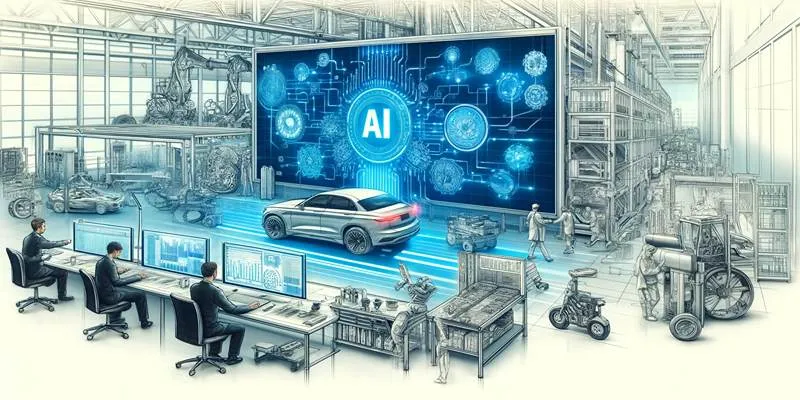Artificial intelligence (AI) is revolutionizing the retail sector by transforming how businesses operate and interact with consumers. From automated check-ins to personalized shopping experiences, AI is streamlining operations and enhancing customer satisfaction. Machine learning provides retailers with insights into consumer behavior, enabling better product recommendations and more effective marketing strategies. Additionally, AI- powered chatbots offer consumers quick responses to their inquiries, significantly improving customer service.
Predictive analytics have made inventory management more efficient, allowing businesses to minimize stock shortages and reduce waste. AI security systems have also enhanced fraud detection capabilities. By leveraging AI, companies can deliver faster, smarter, and more customized shopping experiences. Retailers must adapt to the evolving AI landscape to remain competitive. Those who embrace AI will see increased customer satisfaction and higher sales.

Personalized Shopping Experiences
AI is enabling more personalized shopping experiences for consumers. Retailers use AI to analyze past purchases and browsing patterns, allowing them to recommend products that customers are most likely to buy. This use of machine learning in recommendation engines is driving sales. AI also powers targeted advertising and personalized emails, increasing customer engagement and conversion rates. Virtual assistants powered by AI help consumers quickly find suitable products.
AI-powered chatbots provide 24/7 customer support, offering quick answers and improving client satisfaction. Natural language processing enables these chatbots to understand human inquiries better. Additionally, augmented reality is enhancing online shopping experiences, allowing consumers to visualize home furnishings or try on clothing before purchasing. With AI, retailers are creating seamless and personalized shopping experiences that boost repeat sales and foster customer loyalty.

AI in Inventory and Supply Chain Management
AI is revolutionizing inventory management for retailers. Predictive analytics improve demand forecasts, reducing issues with understocking and overstocking. AI-driven systems analyze sales data and seasonal trends to anticipate future product demand, helping businesses maintain optimal stock levels. In automated warehouses, AI-driven robots expedite order fulfillment.
AI enhances logistics through route optimization, reducing transportation costs and speeding up delivery. AI-powered inventory tracking prevents stock loss, providing retailers with real-time supply chain monitoring capabilities. By identifying potential supply chain disruptions before they become significant issues, AI ensures better customer satisfaction and smooth operations. AI-driven automation in retail supply chains saves time and money, boosting overall efficiency.
AI-Powered Checkout and Payment Systems
AI is streamlining the checkout process in retail. AI-driven self-checkout technologies reduce lines, allowing customers to scan and pay for their items without cashier assistance. Facial recognition payment systems enable faster transactions, while AI detects unusual payment patterns to reduce fraud risk, ensuring secure transactions for both customers and stores. AI-powered voice assistants further simplify payments.
Consumers can complete transactions using voice commands, enhancing the online shopping experience. AI drives mobile payments for seamless transactions, and retailers use machine learning to identify and prevent fraudulent activities. AI detects irregular spending patterns and blocks suspicious transactions. Faster and more secure checkout systems increase customer satisfaction, transforming the purchasing process.
AI in Customer Service and Chatbots
AI-powered chatbots are transforming customer service. These virtual assistants provide immediate assistance, managing multiple inquiries simultaneously and reducing wait times. Natural language processing enables chatbots to understand and respond accurately to customer questions, offering personalized recommendations based on shopping behavior.
AI chatbots assist with order management and refunds, reducing the need for human customer service representatives. AI-backed voice assistants enhance shopping experiences by allowing consumers to search for products using voice commands. AI enables companies to offer round-the-clock customer service, lowering operational costs and speeding up response times. AI-driven customer service is simplifying purchasing and ensuring fast, accurate support for clients.
AI and Retail Marketing Strategies
AI’s data-driven insights are transforming retail marketing strategies. AI tools analyze consumer preferences and shopping habits, enabling companies to design personalized marketing plans. Retailers use AI to deliver targeted advertisements to the right audience, and AI-driven emails boost engagement and conversion rates. Predictive analytics allow retailers to anticipate consumer needs, enhancing advertising campaigns.
AI-powered tools analyze social media trends, enabling companies to create relevant content for their target audience. Improved customer segmentation through AI leads to better marketing plans. AI-generated content enhances brand messaging and engagement. Retailers use AI to develop automated pricing strategies, analyzing market demand and competitor pricing to determine optimal pricing for maximum sales. AI-backed marketing strategies increase customer engagement, brand loyalty, and sales.
AI and Security in Retail
AI is enhancing security in retail environments. AI-powered surveillance cameras detect unusual behavior, and facial recognition technology aids in identifying shoplifters. AI-driven payment fraud prevention tools analyze transaction patterns to identify fraud attempts, protecting online retailers from hacking attempts. Real-time threat detection through AI enhances data security, and AI-driven access control systems improve retail security.
AI helps prevent inventory theft by monitoring for suspicious behavior. AI- driven loss prevention technologies protect consumer data and enhance store security. With AI advancements, retail companies are becoming safer and more secure, reducing financial losses through improved security measures.
Conclusion
Artificial intelligence is revolutionizing the retail industry in numerous ways. It streamlines checkout processes, enhances inventory management, and personalizes shopping experiences. AI-driven marketing strategies boost sales, while AI chatbots improve customer service. Additionally, AI-powered surveillance enhances retail security. By increasing operational efficiency, AI is reshaping the retail landscape. Retailers who adopt AI will stay ahead of the competition. As AI continues to evolve, businesses must embrace its potential. AI-driven innovations will shape the future of retail.
 zfn9
zfn9





















